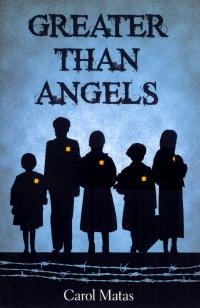| ________________
CM . . .
. Volume XX Number 9. . . .November 1, 2013
excerpt:
Greater Than Angels begins [see above excerpt] in this dramatic way with Anna and her friend Klara hiding from soldiers in a fake woodpile, and, as they try to stay still and silent, Anna reminisces about all the events that led to that moment. This is a story about the German Jews in World War II who were sent to Vichy France and the French people who helped them. Anna and her friends and family are rounded up in Mannheim and packed onto a train. They are relieved to discover that they are not being sent to a work camp; however, the French refugee camp has terrible conditions and little food. Anna’s grandmother dies soon after they arrive. The prisoners do their best with what they have, and volunteers try to make things better with no funding. Anna organizes concerts to raise people’s spirits, and she attends a Torah study group with the other youth. After Anna spends a year in the refugee camp, a child welfare organization arranges for her and a few other children to be taken to a children’s home in Le Chambon-sur-Lignon. For the first time, they have enough food to eat and are allowed to go to school. Anna’s friend Rudi is involved in forging passports for Jews to sneak out of the country, and Anna helps him deliver them secretly. Anna gets permission to return to the refugee camp to visit her mother and aunt and to find out how the other children’s parents are. She arrives just in time to see everyone from the refugee camp being loaded on trains to be sent back to Germany. She is able to say goodbye to her mother and aunt, but she knows she will never see them again. Anna returns to Le Chambon. The villagers have received orders to round up all the Jews in the area and send them to Poland. But when the gendarmes come, the villagers help the children escape and hide. This is when Anna ends up in the woodpile. Eventually Anna and Klara are able to get across the border into Switzerland and safety. The story of the French villagers who risked their own lives to save hundreds of Jews is dramatic and moving. Greater Than Angels brings the story to life with excitement, suspense and even humour. Anna is a bold, feisty character who likes telling jokes. She expresses her outrage at their situation rather than meekly accepting it, and she has the courage and pragmatism to save herself and her friends. The novel is fast-paced and tightly written, managing to pack much historical information into a short length. It also uses the children’s lessons with a rabbi to raise the moral and existential questions that such an atrocity demands. Very occasionally the narrative begins to sound didactic, and a few times the framing technique of Anna in the woodpile remembering events becomes awkward, but, on the whole, Greater Than Angels is very successful at telling a compelling story in a powerful way. A map at the beginning shows Vichy France and the locations mentioned in the story, and there is a brief Afterword wherein the author shares her experiences of interviewing survivors. Greater Than Angels tells a story that is less well known than other Holocaust happenings, a story that highlights the best of humanity in the worst of circumstances. It would work well in a classroom and will appeal to readers of historical fiction, war fiction, and stories of ordinary people behaving heroically. Highly Recommended. Kim Aippersbach is a freelance editor and writer with three children in Vancouver, BC.
To comment
on this title or this review, send mail to cm@umanitoba.ca.
Copyright © the Manitoba Library Association. Reproduction for personal
use is permitted only if this copyright notice is maintained. Any
other reproduction is prohibited without permission.
NEXT REVIEW |
TABLE OF CONTENTS FOR THIS ISSUE
- November 1, 2013.
AUTHORS |
TITLES |
MEDIA REVIEWS |
PROFILES |
BACK ISSUES |
SEARCH |
CMARCHIVE |
HOME |
